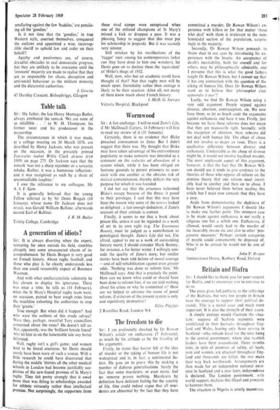The freedom to die
Sir: I am profoundly shocked by Dr Rowan Wilson's article on euthanasia (7 February), as much by his attitude as by the frivolity of his arguments. Firstly, he states that horror felt at the idea of murder or the taking of human life is not widespread and is, in fact, a sentimental fic- tion. He goes on to prove this by making a number of dubious generalisations. Surely the fact that some murderers. or even many, feel no remorse proves nothing. Murderers by definition have deficient feeling for the sanctity of life. One could indeed argue that all mur- derers are abnormal by the fact that they have committed a murder. Dr Rowan Wilson's ex- perience with killers or for that matter 'those who deal' with them is irrelevant to the non- homicidal section of the population, surpris- ingly in the majority.
Secondly, Dr Rowan Wilson proceeds to throw dust in our eyes by introducing his ex- periences with the Jesuits. An acceptance of death's inevitability, both for oneself and for others, may be philosophically admirable, and I presume that this is what the good fathers taught Dr Rowan Wilson, but I cannot see that it has any connection with the question of the taking of human life. Does Dr Rowan Wilson want us to believe that 'philosopher c'est apprendre h trier'?
Lastly, we find Dr Rowan Wilson using a very odd argument. People argued against divorce, abortion, contraception, etc. We now have them, so let us brush aside the arguments against euthanasia and have it too. Firstly, just because we have these reforms does not mean that they are necessarily right. Secondly, with the exception of abortion, these reforms did not deal with human life. The effect of abuse did not involve so major an issue. There is a qualitative difference between divorce and euthanasia. Undesirable as the abuse of divorce might be, it would not involve legalised murder. The most unpleasant aspect of this argument, however, is that the fact that Dr Rowan Wil- son should use it tends to give credence to the theories of those who oppose all reform on the domino theory that one reform must inevit- ably lead to another and then on to abuse. I have never believed them before reading this article but I must now concede that they have a case.
Aside from demonstrating the shakiness of Dr Rowan Wilson's arguments I should like to make one further point. The strongest case to be made against euthanasia is not really a religious one but a selfish one. Euthanasia, if allowed, would surely lead to the murder of the incurably insane etc and also to other 'pro- gressive measures.' Perhaps certain categories of people could conveniently be disposed of. Who is to be certain he would not be one of those?
John V. Bryan Summertown House, Banbury Road, Oxford


































 Previous page
Previous page